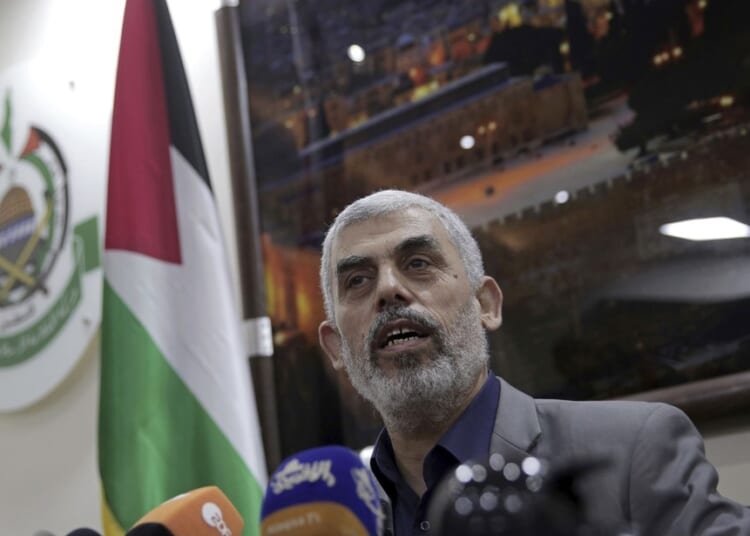In theory, this sounds like a win for Israel in its war. In practice, though, it may just be another opportunity for Hamas to escape the IDF. According to reports this morning, Qatar has proposed what amounts to a capitulation from Hamas.
The real question is: do the Israelis think Hamas would ever capitulate? The war cabinet ministers have begun discussing it already:
A new Qatari proposal for a ceasefire would see the leaders of Hamas all be deported and all of the hostages captured by the terrorist group released in exchange for the withdrawal of the IDF from Gaza, according to news revealed by Channel 13 citing sources close to officials in Doha, Qatar.
If such a proposal were implemented, hostages would be released in stages. …
The war cabinet will convene on Wednesday at 6 p.m. to discuss the proposal, according to N12.
If the meeting took place as scheduled, it began 20 minutes ago. The proposal raises many questions, chief among them verification of exile and the rank of “leaders” to be expelled from Gaza. Presumably Qatar wants Yahya Sinwar and Mohammed Deif to get exfiltrated, while Israel would almost certainly demand expulsion for any Hamas terrorist of any rank as part of a deal to withdraw. How would that work, anyway? Does Qatar have a landing place for the exiles, or are they offering Hamas’ leadership shelter themselves? No other Sunni nation will give Hamas sanctuary; they won’t even allow Gazans in general to relocate to their countries.
Israel may question the timing, too. The IDF just announced that they have operational control of Khirbat Ikhza’a, just outside of Khan Younis. It’s a key strategic position, and more importantly, previously considered an escape route for Hamas leadership out of the trap in Khan Younis:
Khirbat Ikhza’a is just slightly southeast of Khan Yunis, making it an important strategic location for cutting off Hamas forces from maneuvering or fleeing in various directions there.
It is also only a few kilometers from the Jewish kibbutz of Nir Oz and was one of Hamas’s invasion launch points to take over that kibbutz on October 7, along with Nirim and Ein Hashlosha.
The IDF’s 5th Brigade destroyed hundreds of terror positions and killed dozens of Hamas terrorists to achieve operational control both above and below ground.
In addition, IDF forces found a variety of personal items, such as challah covers, bicycles, agricultural items that Hamas stole from Nir Oz residents, and some clues relating to Israelis who were kidnapped on October 7.
Needless to say, this offer of capitulation in exchange for safe passage out of Gaza seems highly motivated by the IDF’s gains. However, IDF control of this strategic location allows them to defend southern Israel much more effectively, a value that the war cabinet has to weigh in this calculation.
Those are just the short-term questions. Longer term, how can Qatar and other Sunni nations involved in the post-war Gaza project prevent Hamas’ return? Hamas had been incredibly popular — at least nominally — before and at the start of the war, not just in Gaza but also in the West Bank. A capitulation to Israel would likely damage their standing significantly, but Hamas’ political strength isn’t going to vanish entirely even in a retreat and defeat. It took years to de-Nazify occupied Germany, and that was after an utter demolition of the Nazis.
Defense minister Benny Gantz warned earlier that a deal now would inevitably lead to another war. The IDF has control of northern Gaza, Gantz declared, but Hamas hasn’t yet been fully defeated:
Gantz warned that the IDF must continue its operations in the Gaza Strip amid the threat of Hamas regaining control of the Strip.
“If we stop now, Hamas will regain control,” the war cabinet minister warned.
If Hamas abides by a full expulsion, then perhaps that will solve that issue. But does anyone really believe that Hamas — and its sponsors in Tehran and within the Muslim Brotherhood — plan to abide by such an agreement? This sounds more like a hudna than a true capitulation, and likely Gazans would believe it to be that as well.
Meanwhile, Antony Blinken is in Ramallah trying to push for a Palestinian state with a “revitalized” Palestinian Authority in charge. Even Mahmoud Abbas isn’t buying that argument:
Blinken told Abbas that the White House supports “tangible steps” toward the creation of a Palestinian state, said State Department spokesman Matthew Miller.
The top US diplomat also reiterated Washington’s longstanding position that a Palestinian state must exist alongside Israel, “with both living in peace and security.” …
Unnamed sources told Sky News Arabia that the Ramallah meeting was “tense” and marked by “arguments.” …
“If you do not have the ability to release funds, how will you have the ability to put pressure on Israel and achieve peace and a Palestinian state?” Abbas demanded.
Blinken repeated demands that Abbas undertake reforms in the PA, the report said.
Any discussions of a Palestinian state are useless as long as the Palestinians refuse to accept Israel as a permanent Jewish state on present borders. The Palestinians — both in Fatah and Hamas — refuse to negotiate in good faith on that basis. The Gazans just proved on October 7 that they are far more interested in committing a genocide in Israel than in peace, and so are their terror-symp Western allies who mindlessly chant “from the river to the sea” and talk about their rapist-murderer “glorious martyrs” of the Al-Aqsa Flood.
The US should make that futility crystal clear to Abbas and the rest of the Palestinians. Only that will prompt new polities within their populations, new polities that deal rationally with the reality of Israel and the necessity of accommodation. Until they do, the Israelis have no partner for any two-state discussions.

